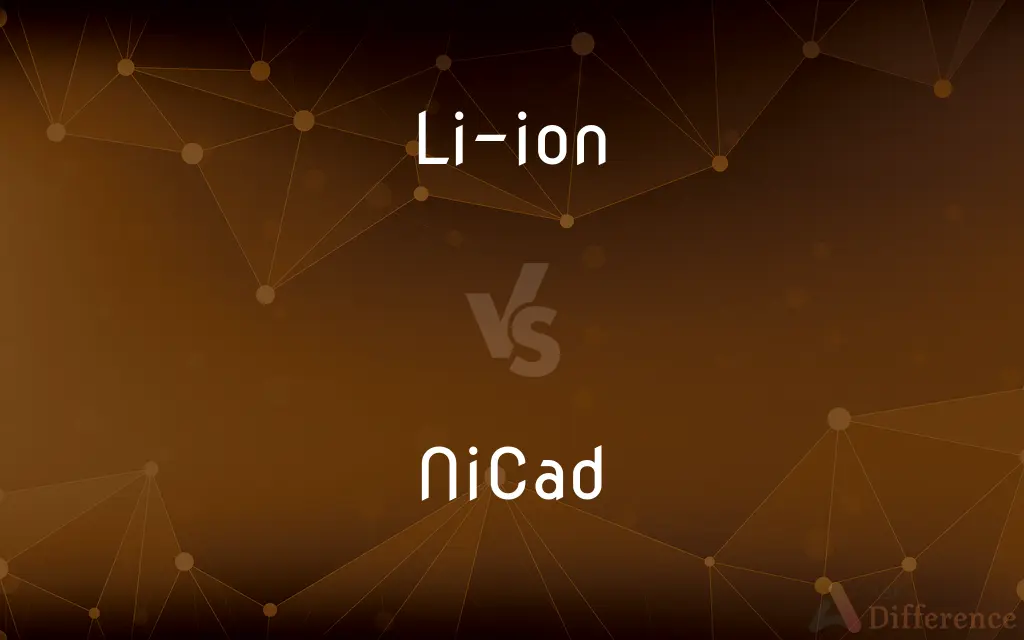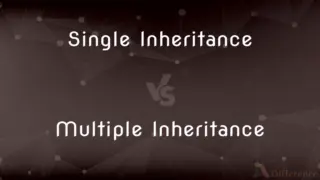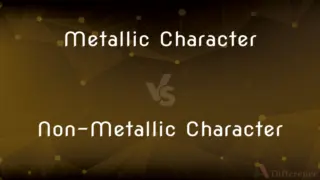Li-ion vs. NiCad — What's the Difference?
By Tayyaba Rehman & Urooj Arif — Published on February 10, 2024
Li-ion (Lithium-ion) is a newer, lighter battery technology with higher energy density and no memory effect. NiCad (Nickel-Cadmium) batteries are older, heavier, and have memory effect issues.

Difference Between Li-ion and NiCad
Table of Contents
ADVERTISEMENT
Key Differences
Li-ion (Lithium-ion) batteries are modern, lightweight, and have high energy density. They're commonly used in smartphones and laptops due to their compact size and longer lifespan. On the other hand, NiCad (Nickel-Cadmium) batteries are older and heavier, known for their durability and consistent performance. However, they suffer from memory effect, causing a decrease in capacity over time if not fully discharged.
Li-ion batteries are more environmentally friendly than NiCad, as they don't contain toxic metals like cadmium. They also provide higher voltage and energy efficiency. In contrast, NiCad batteries have a lower energy density, resulting in a shorter runtime and less power for the same size.
Li-ion batteries excel in applications where weight and size matter, like portable electronics. They have a lower self-discharge rate and a longer cycle life compared to NiCad. NiCad batteries, though bulkier, are still used in power tools and applications requiring consistent power output and resilience.
Comparison Chart
Energy Density
High
Moderate
Memory Effect
Minimal
Pronounced
ADVERTISEMENT
Environmental Impact
Lower (no toxic metals)
Higher (contains cadmium)
Weight and Size
Light and Compact
Heavy and Bulky
Cycle Life
Longer
Shorter
Compare with Definitions
Li-ion
Commonly used in portable electronics and electric vehicles.
Laptops and electric cars benefit from the compact Li-ion design.
NiCad
An older, durable battery with moderate energy density.
Some power tools still use NiCad batteries for reliability.
Li-ion
Resistant to memory effect, ensuring longer lifespan.
Unlike older batteries, Li-ion doesn't suffer from memory loss.
NiCad
Contains toxic cadmium, posing environmental concerns.
Recycling NiCad batteries requires special handling due to cadmium.
Li-ion
A lightweight battery with high energy density.
My smartphone uses a Li-ion battery that lasts all day.
NiCad
Bulkier in size and heavier compared to modern alternatives.
Flashlights using NiCad batteries can be larger and heavier.
Li-ion
Employs lithium ions for energy storage.
Electric vehicles often rely on Li-ion technology for efficiency.
NiCad
Known for providing consistent power output in various applications.
Emergency devices often rely on NiCad batteries for reliability.
Li-ion
Offers higher voltage and energy efficiency.
Li-ion batteries power most modern gadgets due to their efficiency.
NiCad
Prone to memory effect, affecting performance over time.
If not fully discharged, NiCad batteries may lose capacity.
NiCad
(electronics) rechargeable nickel-cadmium battery
NiCad
A rechargeable battery with a nickel cathode and a cadmium anode; often used in emergency systems because of its low discharge rate when not in use
Common Curiosities
Are Li-ion batteries suitable for electric vehicles?
Yes, Li-ion technology is commonly used in electric vehicles for its high energy efficiency.
Why are NiCad batteries less environmentally friendly?
NiCad batteries contain toxic cadmium, posing environmental hazards during production and disposal.
What is a common application for NiCad batteries?
NiCad batteries are often used in power tools due to their durability and consistent power output.
What makes Li-ion batteries popular in smartphones?
Li-ion batteries are preferred for smartphones due to their compact size, high energy density, and longer cycle life.
What is the primary disadvantage of NiCad batteries?
NiCad batteries are heavier and bulkier compared to more modern battery technologies.
What is the main advantage of Li-ion batteries?
Li-ion batteries are lightweight and have high energy density, making them ideal for portable devices.
Why do some emergency devices use NiCad batteries?
NiCad batteries are known for providing consistent power output, making them suitable for critical applications like emergency devices.
How should NiCad batteries be disposed of properly?
NiCad batteries should be recycled at designated facilities to prevent the release of toxic cadmium into the environment.
Do Li-ion batteries suffer from memory effect?
No, Li-ion batteries are resistant to memory effect, ensuring a longer lifespan.
How does memory effect impact NiCad battery performance?
Memory effect in NiCad batteries leads to a decrease in capacity if not fully discharged before recharging.
Are NiCad batteries still commonly used today?
While less common in consumer electronics, NiCad batteries are still used in specific applications, such as some power tools.
Can Li-ion batteries be recycled easily?
Yes, Li-ion batteries are recyclable, and recycling programs are available to handle the process responsibly.
What is the main disadvantage of Li-ion batteries?
Li-ion batteries can be more expensive to produce compared to older technologies like NiCad.
Are Li-ion batteries more energy-efficient than NiCad?
Yes, Li-ion batteries offer higher energy efficiency compared to NiCad batteries.
Do Li-ion batteries have a longer lifespan than NiCad?
Generally, Li-ion batteries have a longer cycle life compared to NiCad batteries.
Share Your Discovery

Previous Comparison
Single Inheritance vs. Multiple Inheritance
Next Comparison
Metallic Character vs. Non-Metallic CharacterAuthor Spotlight
Written by
Tayyaba RehmanTayyaba Rehman is a distinguished writer, currently serving as a primary contributor to askdifference.com. As a researcher in semantics and etymology, Tayyaba's passion for the complexity of languages and their distinctions has found a perfect home on the platform. Tayyaba delves into the intricacies of language, distinguishing between commonly confused words and phrases, thereby providing clarity for readers worldwide.
Co-written by
Urooj ArifUrooj is a skilled content writer at Ask Difference, known for her exceptional ability to simplify complex topics into engaging and informative content. With a passion for research and a flair for clear, concise writing, she consistently delivers articles that resonate with our diverse audience.
















































